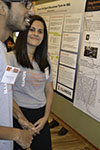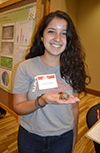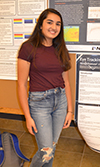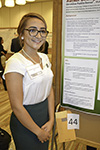Stories about...INCLUSION Research Experiences for Undergraduates (REU)
 NCSA Summer Research Exposes Undergrads to Open Source Software, Possible Future Careers
NCSA Summer Research Exposes Undergrads to Open Source Software, Possible Future Careers
August 4, 2020
Exactly what is open source software? During the summer of 2020, thanks to the National Center for Supercomputing Applications (NCSA), four undergraduate students who participated in the REU INCLUSION (Incubating a New Community of Leaders Using Software, Inclusion, Innovation, Interdisciplinary and OpeN-Science) discovered just what open source software is: mostly free software whose source code is made publicly available so users can modify it to suit their needs. As part of this Research Experience for Undergraduates (REU), the students also helped to develop and contribute to some primarily open-source software projects. However, this software-in-research training experience was not just about exploring open source software and programming; students also received professional development, learned about how to present research then actually did so, plus made some relationships and networked with Computer Science researchers. In addition, a fifth student, a returnee from last year's REU INCLUSION, also conducted research as a part of NCSA’s International Research Internship.
 INCLUSION REU Exposes Undergrads to Computational Research Using Open Source Software
INCLUSION REU Exposes Undergrads to Computational Research Using Open Source Software
August 29, 2019
In the summer of 2019, eleven undergraduate students experienced a computationally-based summer research experience as a part of the National Center for Supercomputing Applications’ (NCSA) NSF-funded INCLUSION (Incubating a New Community of Leaders Using Software, Inclusion, Innovation, Interdisciplinary and OpeN-Science) Research Experience for Undergraduates (REU). In its third and final year, the REU allowed the students to acquire or improve their coding skills, possibly even learning a new programming language as they completed projects using Open Source Software. In addition to finding out what research is like, they also experienced another activity they will most likely use should they end up in grad school: they created posters then presented their research. Some of the students also figured out what their next step might be careerwise: matriculating to Illinois to further their education. Plus, the participants also made some relationships and did some networking.
 Illinois Summer Research Symposium Showcases Undergraduates’ REU Experiences
Illinois Summer Research Symposium Showcases Undergraduates’ REU Experiences
August 14, 2018
On July 19–20, 2018, over 150 undergraduate students and pre-doctoral students presented posters at the 2018 Illinois Summer Research Symposium (ISRS) as a culmination of their summer research experiences at Illinois. The students not only conducted studies in the labs of some of Illinois’ world-renowned researchers, but many of them were part of undergraduate programs that also partnered with SROP, the Graduate College’s Summer Research Opportunities Program. This allowed the undergrads to participate in professional development activities, many of them in preparation for possibly continuing their education and research in graduate school, and also provided the students networking opportunities.
 Undergrads Experience Open Source Software & Interdisciplinary Research Via INCLUSION REU
Undergrads Experience Open Source Software & Interdisciplinary Research Via INCLUSION REU
August 13, 2018
Twelve undergraduate students participated in the second summer of NCSA’s NSF-funded INCLUSION (Incubating a New Community of Leaders Using Software, Inclusion, Innovation, Interdisciplinary and OpeN-Science) REU (Research Experience for Undergraduates). Students gained skills they hope employ down the road, including coding in a new programming language and using Open Source Software. Plus, they got the chance to prepare a poster and present their research at the July 25th end-of-the-summer Poster Session at the NCSA (National Center for Supercomputing Applications). Participants also made some new relationships.
 INCLUSION REU Seeks to Foster Diversity While Exposing Undergrads to Coding Via Open Source Software
INCLUSION REU Seeks to Foster Diversity While Exposing Undergrads to Coding Via Open Source Software
August 21, 2017
“We're doing this because we would like to get students that wouldn't have the opportunity otherwise to think about software, to learn about open source software, and then potentially be able to use that in either graduate school or in industry.” – Daniel S. Katz, PI
Ten undergraduate students were on campus this summer to participate in NCSA’s new 3-year REU, INCLUSION (Incubating a New Community of Leaders Using Software, Inclusion, Innovation, Interdisciplinary and OpeN-Science), funded through the NSF’s Office of Advanced Cyber Infrastructure. The goals of the REU are to enable ten undergraduate students each year to develop software and contribute to software projects, specifically Open Source Software projects; to make the population of software developers more diverse; and to foster cross-disciplinary collaboration across all fields with projects led by two mentors from different disciplines. Student participants gained skills they hope to use in the future: they learned about Open Source Software and programming; they learned how to present research; plus they made some relationships and networked.













.jpg)
















